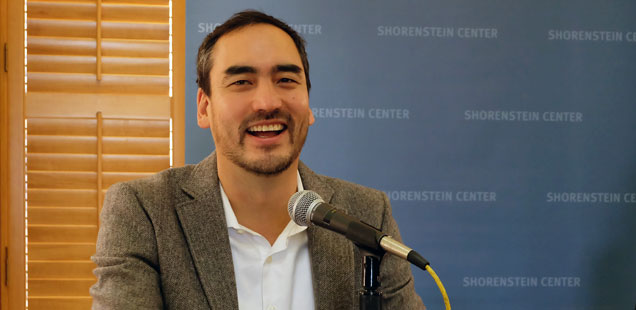Dear Friends of the Shorenstein Center,
This week The Washington Post ran two pieces that aptly summarize what I think are the twin challenges to the state of journalism that this presidential race has surfaced. Catherine Rampell wrote about the damage that misinformation from conservative media has had on the Republican Party and the presidential race at large; and Dana Milbank’s analysis that “watchdogs” were outnumbered by “horserace” journalists, with serious consequences. This business of the news business involves chasing stories and audience—but it also must involve some leadership, making decisions that shape coverage and the public’s attention.
This week at the Shorenstein Center, we took a break from election-related coverage to further explore ideas involving leadership and audience, and the implications for media producers and consumers in today’s digital age. We’ve had some exceptional conversations—with Jeffrey Rosen, who asked what responsibility web platforms have to uphold First Amendment values, with Tim Wu, who discussed the pitfalls of a market where the audience is the product, and with Jose Antonio Vargas, who asked us to question and demand more from the media’s framing of the immigration debate in the U.S.
Nicco Mele
Director, Shorenstein Center
This Week at the Shorenstein Center
Tim Wu: The Battle for Our Attention. Tim Wu, author of The Master Switch and professor at Columbia Law School, discussed his new book, The Attention Merchants: The Epic Scramble to Get Inside Our Heads. Wu, whose past work also includes the FTC, Google, and Free Press, discussed the historical origins of the attention economy, how people are fighting back against the encroachment of advertising, and considerations for media and technology companies.
Jeffrey Rosen—The Deciders: The Future of Free Speech in a Digital World. Jeffrey Rosen, President & CEO of the National Constitution Center, Professor of Law at The George Washington University Law School, and a Contributing Editor for The Atlantic, delivered the ninth annual Salant Lecture on Freedom of the Press. Rosen argued that Twitter, Facebook, and Google are facing increased pressure to moderate content in a way that is inconsistent with First Amendment protections—in the name of promoting civility rather than democracy. He discussed the controversy surrounding Facebook’s removal of a Pulitzer Prize-winning photo from the Vietnam War, problems regarding transparency in content moderation, the EU’s right to be forgotten ruling, and the challenges of online mobs and hate speech, among other topics.
Define American: Humanizing the Immigration Debate with Jose Antonio Vargas. Pulitzer Prize-winning journalist, CEO of Define American, and prominent undocumented immigrant Jose Antonio Vargas discussed his experience as an immigrant in the U.S. and the failings of the current policy and media debates about immigration.
American Wreckage. Nicco Mele discussed the fault lines of gender, race, and class that have been exposed during the 2016 election on a panel on Radio Open Source.
Hacking: What Journalists Need to Know. A Conversation with Bruce Schneier, from Journalist’s Resource.
News from Our Fellows
What the Campaign Press Should Not Be Neutral Toward. Jay Rosen, spring 1994 fellow, writes that there are things journalists “can advocate for in a contested election—and other things they can legitimately oppose.”
Election Coverage and Commentary
If Trump Loses, the News Media Should Break the Addiction. But Can They? From The Washington Post.
Presidential Campaigns Haven’t Agreed To “Acceptable” Post-Election Press Access, from Huffington Post.
Fact-Checking Clinton and Trump Is Not Enough, from The Conversation.
Is Media Bias Really Rampant? Ask the Man Who Studies It for a Living, from Poynter.
In a Post-Truth Election, Clicks Trump Fact, from The Conversation.
Media Business
The Presidential Debates Set Ratings Records in 2016, from Adweek.
Newsonomics: Here Are 10 Storylines We’ll Be Talking about into 2017, from Nieman Lab.
Trump TV Offers (Fledgling) Framework for Potential Media Future, from The New York Times.
Social Media
Hyperpartisan Facebook Pages Are Publishing False and Misleading Information at an Alarming Rate, from BuzzFeed News.
In a Policy Change, Facebook Will Allow More Newsworthy Graphic Content, from Poynter.
Facebook Employees Argued Trump’s Posts Should Be Banned as Hate Speech, from The Wall Street Journal.
Ask the Ethicist: Should Journalists Use Facebook’s New Endorsement Tool? From Poynter.
Sign up to receive Media and Politics Must Reads in your inbox each week. Also connect with us on Twitter and Facebook for more updates.


